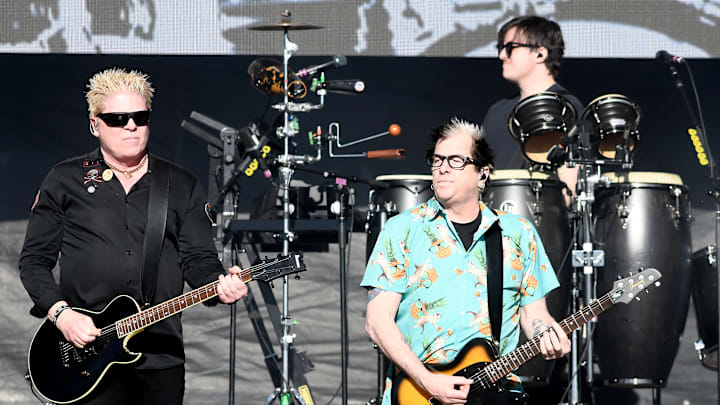[NOTE: This article often reflects the author's subjective opinions on The Offspring, which is complicated. On the one hand, they used to be his favorite band, but, over time, he feels they strayed too far away from their roots. Keep this in mind, please.]
The Offspring is an American punk rock band that emerged in the 1980s and gained widespread recognition and popularity in the 1990s. Led by core members Bryan "Dexter" Holland (lead vocals/rhythm guitar) and Kevin "Noodles" Wasserman (lead guitar), their music has had a significant impact on the punk rock and alternative rock genres, as well as popular culture in general.
1. "Smash": Commercial Success:
The Offspring achieved immense commercial success, particularly with their 1994 album Smash. It became one of the best-selling independent albums of all time and produced hit singles like "Come Out and Play," "Self Esteem," and "Gotta' Get Away," as well as other great tracks that weren't considered hits on the charts but still hit big with fans. This success helped bring punk rock to a mainstream audience in the mid-1990s. (NOTE: Back then, not only did MTV play music videos, but they also played stuff like The Offspring, or Soundgarden's "Black Hole Sun," or even weirder fare like The Butthole Surfers).
2. The Offspring's role in the Punk Rock Revival:
The Offspring's music played a pivotal role in the punk rock revival of the 1990s. Their catchy melodies, relatable lyrics (sung by Dexter Holland), and energetic performances attracted a new generation of fans to punk music and inspired many other bands to explore the genre. In addition to Green Day’s Dookie and bands like NOFX, Pennywise, and Rancid, The Offspring's blend of punk rock and pop sensibilities had a significant influence on the development of the pop punk subgenre. Bands drew inspiration from The Offspring's sound and success, shaping the pop punk scene of the late 1990s and 2000s.
3. Lyrical themes of The Offspring:
The band's lyrics often touch on themes of rebellion, adolescence, alienation, and social commentary, often with an attitude similar to The Who's "My Generation." In fact, it's maybe instructive to look at some of their later songs that I don't personally love, to show that even they have some merit. For example, one song I don't personally like, "Pretty Fly (for a White Guy)," might still deserve some credit for exploring cultural quirks, as well as the creative diss: "He may not have a clue and he may not have style, but everything he lacks well he makes up in denial!"
Then there's the likable-yet-highly overplayed "The Kids Aren't Alright," which nonetheless deserves a respectful nod for examining serious generational issues. It also has some great guitar-work (this is a band known for crafting some pretty tasty riffs, actually — in fact, the first guitar part I learned was that cool "Arabic" riff in "Come Out and Play," and it's still one of my favorite lines all these years later!).
There are many ingredients making their music relatable to a wide range of listeners, and they've enjoyed continued relevance. The Offspring has maintained a dedicated fan base over the years, and their music continues to resonate with audiences. They have released numerous albums, and while their commercial peak was in the 1990s and are no longer as "indie," they have remained a fixture in the punk rock and alternative rock scenes. Of course, like a lot of fans, I still prefer their first 4 albums.
4. Contribution to punk's evolution:
The Offspring's willingness to experiment with different musical styles and incorporate elements from other genres has contributed to the evolution of punk rock. They've incorporated elements of ska, grunge, and hard rock into their music, expanding the boundaries of the genre. Granted, they're not the only punk band to play around with genres, but they (generally) manage to do it without sounding too much like different versions of themselves, especially on those earlier albums.
5. Social and political commentary:
Most of The Offspring's songs have tackled social and political issues. "Genocide" has a cool guitar lead riff, but also some compelling lyrics, and the self-titled track from the Smash album is a kick-ass, catchy manifesto. "Bad Habit" is all about road rage with one of the coolest arrangements of swear words ever devised and put to song (seriously, I think they deserve more credit for that, and I'm being serious).
. "Burn It Up" (from their Ignition album) is about the appeal of pyromania, and one song from their debut album was so controversial, they stopped including it in future releases (and it's risky typing its title in a Google search bar). "Americana" critiques American consumer culture, and "Hammerhead" addresses war and militarism (though they rip off the well-known Nirvana bassline from "Stay Away," which, in my view, damages the song).
6. Heaping on more praise
The Offspring's impact on music lies in their ability to bridge the gap between punk and mainstream rock, their influence on the pop punk genre, their catchy and relatable lyrics, and their ability to connect with a diverse audience. They've left a lasting legacy in the world of punk and alternative rock music. Oh, and they are working on a new album and, like everyone and their dog, even have a podcast!
The Offspring is one of the most popular punk rock bands of the past 40 years, selling over 40 million records worldwide. Their music combines elements that helped define the 90's and beyond. However, please don't assume their Greatest Hits is actually their "Best of." Do a deep dive and you'll find Smash and their other early work to be considerably different.
